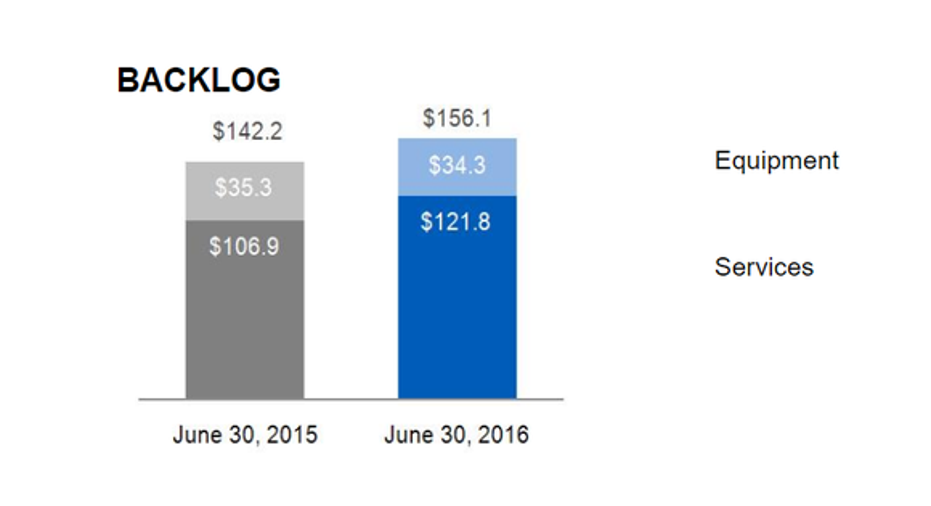General Electric's Most Profitable Segment in 2016 So Far

Boeing 737 MAX with LEAP engine. Image source: CFM International.
General Electric's (NYSE: GE) aviation segment is off to a strong start this year. During the first six months of 2016, aviation revenue increased 7% year over year to $12.8 billion, while operating profits increased 11% year over year to nearly $1.4 billion. Overall, GE's aviation segment represented 23.4% of GE's industrial revenue and 38.6% of its industrial operating profit during this time, making it the company's most profitable segment by a wide margin.
This isn't likely to change in the years ahead, as aviation has a massive backlog to work through and strong expected demand for new passenger aircrafts.
What's driving the results?
Year to date, services made up 56% of aviation's revenue, while equipment sales made up 44%. During this time, aviation's revenue benefited from higher prices in its commercial engines and spare parts business, increased military spare parts volume, and higher services sales. This was partially offset by lower GEnx engine shipments and military volume outside of spares. Operating profits were driven by an increase in services spending, improved productivity, and higher prices.All told, aviation's year-to-date operating margin increased 80 basis points year over year to 22.5%.
By subsegment, commercial engines and services made up the lion's share of GE's aviation revenue, accounting for 74% of the segment's total revenue during the first half of the year. On a unit basis, GE delivered 1,401 commercial engines in the first half, an increase of 5% year over year.
Data source: GE.
A backlog bigger than a small country
Through CFM International, a 50-50 joint venture with Safran, GE shipped the first 11 out of 11,000 next-generation LEAP engines during the second quarter, and ended the quarter with $156.1 billion in its aviation backlog, an increase of 9.8% year over year.
The LEAP engine is the fastest-selling engine in aviation history and succeeds the tried-and-true CFM56. CFM has delivered over 29,500 CFM56s since its introduction.LEAP is 15% more fuel efficient than its predecessor and will be primarily featured on next-generation single-aisle aircraft from Boeing (NYSE: BA) and Airbus. According to CEO Jeff Immelt, GE expects to ship about 110 engines this year and reach 1,900 LEAP engines shipped by 2019.
In other words, delivering LEAPs to customers is a crucial component for GE to recognize revenue sitting in its aviation backlog.
Image source: GE.
Since the majority of GE's backlog is services-based, aviation's margins are likely to improve, as services tend to command higher margins than equipment orders. These services can range from scheduled maintenance and complete overhauls, to real-time monitoring that tap into the company's digital offerings as a way to reduce unscheduled disruptions.
Currently, GE has 35,000 engines in service, but only a small fraction have subscribed to its digital services. By the end of 2020, GE hopes to have more than 44,000 engines flying across the world, giving the company an even greater opportunity to generate incremental services revenue.
The view from 38,000 feet
GE's aviation segment is benefiting from robust demand for more fuel-efficient aircrafts and the expectation that commercial aviation traffic will grow substantially over the next 20 years. Between 2016 and 2035, Boeing estimates that nearly 40,000 new commercial aircrafts will enter service.
Image source: Boeing.
As the sole source on Boeing's upcoming 737 MAX and 777X aircrafts, and winning over 50% of Airbus A320neo orders, GE's aviation segment likely has a long tailwind of growth ahead of it.
A secret billion-dollar stock opportunity The world's biggest tech company forgot to show you something, but a few Wall Street analysts and the Fool didn't miss a beat: There's a small company that's powering their brand-new gadgets and the coming revolution in technology. And we think its stock price has nearly unlimited room to run for early in-the-know investors! To be one of them, just click here.
Steve Heller has no position in any stocks mentioned. The Motley Fool owns shares of General Electric. Try any of our Foolish newsletter services free for 30 days. We Fools may not all hold the same opinions, but we all believe that considering a diverse range of insights makes us better investors. The Motley Fool has a disclosure policy.



















